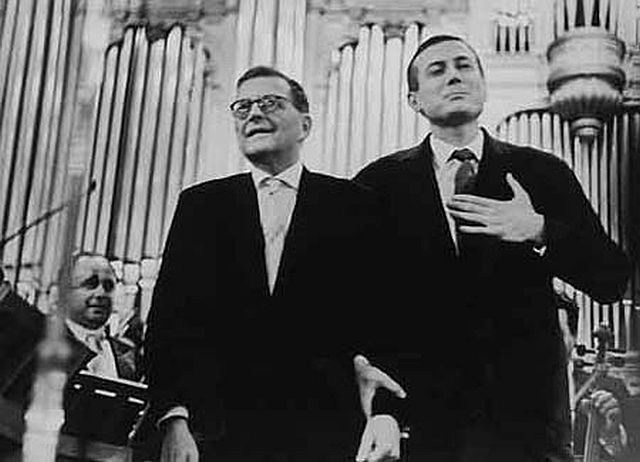Ear witness #84 Babi Jar. ‘Everything in remembrance of you…’, today our series about Russian music in the 20th century is about the monumental work that Dmitri Shostakovich composed as a tribute to the Jewish victims of Babi Jar, and the poem that Yevgeny Yevtushenko wrote about the event.
Diane Baker plays the Chaconne from 1963 by Sofia Gubaidulina.
Sergei Slonimsky was born in Leningrad in 1932 as the son of writer Mikhail Slonimsky. From 1943 until 1950 he studied at the Musical College in Moscow, and from 1950 he was at the Leningrad Conservatory, where he became a teacher later on. He studied piano, polyphony and composition under Boris Arapov, Vissarion Shebalin and Orest Yevlakov. His piano sonato was written in 1962.
Slonimsky’s teacher Boris Arapov had studied himself in St. Petersburg under Vladimir Shcherbachov before graduating in 1930 and becoming a teacher, and later director of the composition program. While being sent to the furthest reaches of the Soviet empire, he added the most exotic music to his multifaceted oeuvre. Violinist Mikhail Vaiman, the runner up in Brussels in 1951, plays the violin concerto by Arapov from 1964 with the Leningrad Symphony Orchestra and conductor Arvid Jansons.
‘Babi Jar’ literally means “crevice of the old women” in Ukrainian. It is quite a search to this shallow crevice on the outskirts of Kiev, and there aren’t many signs to help you find the place where the Germans butchered over 30,000 Jews in September 1941. This was the largest genocide of Jews outside the camps during World War II. This inspired the young poet Yevgeny Yevtushenko in 1961 to make a poem that led him to the indignation of the nomenklatura, because the attention was focused on the Jewish victims and there was too little attention for the Russian and Ukrainian victims. This conflict shows itself by the many Jewish, Russian and Ukrainian memorials around the crevice. (the picture shows the memorial for the children)
This also caused troubles in the personal relations of Dmitri Shostakovich. The composer took Yevtushenko’s poem as the opening of his Thirteenth Symphony, and knew when writing whom he wanted as conductor and soloist: Yevgeny Mravinsky and Kievan bass Boris Gmyrja, who had also premiered his Five Romances on text by Yevgeny Dolmatovsky. Gmyrja was very interested at first, but his doubts about the poem of Yevtushenko made him drop out very soon. Even more painful was the rejection of Mravinsky, according to his biographer because his wife was dying, but that does not explain the rupture between the two, that would never fully recover. Mravinsky would not premiere any works by Shostakovich ever again.
The composer turned to Kondrashin, who had reinstated his Fourth Symphony, and the conductor immediately proposed two soloists for the bass part. Days before the premiere a clash occurred between Khrushchev and Yevtushenko, who accused the party leader of anti-Semitism, causing delay in the publication of the poem. Kondrashin was even put under pressure not to perform, or at least to leave out the first part. The conductor didn’t gave in and the replacement of the disappeared soloist Netsjipajlo, Gromadsky, appeared at the last minute to bring the work in premiere on December 18, 1962.
The halls and corridors of the Moscow conservatory bulged out at the premiere. "Only the government’s lodge was empty", according to Krzysztof Meyer. Tension appeared during the execution, as if the hall was electrically charged, and when the final chords of the bells and celesta died away, a hurricane of thunderous applause broke out. With tears in their eyes the poet and the composer entered the stage to be applauded, but the next day the Pravda hardly paid any attention to the premiere. Pictured are the composer and the poet being applauded.
Two weeks later a revised version of Yevtushenko’s poem appeared in the Literaturnaya Gazeta. Shostakovich was deeply hurt that the poet had changed the text without consultation, as the symphony was now no longer the same as well. The Deputy Minister of Culture even demanded that he changed the sentence in his composition. Kondrashin assisted him in changing the text while trying to save the music. The work was blacklisted, and even the most famous conductors who wanted to execute the composition in Russia experienced all kinds of opposition from the authorities. The composer cherished the work for the rest of his life, every year he and his friends celebrated two days that were important to his work: May 12, the premiere of his First Symphony, and July 20, the day he completed his Thirteenth Symphony.
1. Sofia Asgatovna Gubaidulina (1931).
Chaconne for piano (1963).
Diana Baker, piano.
Stradivarius STTR 33756.
2. Sergei Mikhailovich Slonimsky (Leningrad 12.8.1932).
Sonata no. 1 for piano (1962).
Nikita Fitenko, piano.
Altarus AIR-CD-9085.
3. Boris Aleksandrovich Arapov (Petersburg, 12.9.1905 – 21.1.1992).
Concerto for violin and orchestra (1963-64): 1) Grave. Allegro moderato, 2) Lento, 3) Allegro.
Mikhail Vajman, violin, Leningrad Symphony Orchestra conducted by Arvid Jansons.
Melodiya MEL CD 10 00839.
4. Dmitri Dmitriyevich Shostakovich (1906-1975).
Symphony no. 13 flat, opus 113, ‘Babi Jar’, for bass-solo, choir and orchestra (1962): 1) Babi Jar (adagio), 2) Humor (allegretto), 3) In the store (adagio), 4) Fears (largo), 5) A career (allegretto). (Recorded 23.8.1967.)
Arthur Eisen, bass, Choirs Russian Republic and Moscow Philharmonic Orchestra conducted by Kirill Kondrashin (1914-1981).
Melodyia Aulos music AMC2-043-1-10.








